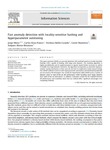Mostrar o rexistro simple do ítem
Fast anomaly detection with locality-sensitive hashing and hyperparameter autotuning
| dc.contributor.author | Meira, Jorge | |
| dc.contributor.author | Eiras-Franco, Carlos | |
| dc.contributor.author | Bolón-Canedo, Verónica | |
| dc.contributor.author | Marreiros, Goreti | |
| dc.contributor.author | Alonso-Betanzos, Amparo | |
| dc.date.accessioned | 2023-11-30T11:43:03Z | |
| dc.date.available | 2023-11-30T11:43:03Z | |
| dc.date.issued | 2022-08 | |
| dc.identifier.citation | J. Meira, C. Eiras-Franco, V. Bolón-Canedo, G. Marreiros, y A. Alonso-Betanzos, «Fast anomaly detection with locality-sensitive hashing and hyperparameter autotuning», Information Sciences, vol. 607, pp. 1245-1264, ago. 2022, doi: 10.1016/j.ins.2022.06.035. | es_ES |
| dc.identifier.issn | 0020-0255 | |
| dc.identifier.uri | http://hdl.handle.net/2183/34389 | |
| dc.description.abstract | [Abstract]: This paper presents LSHAD, an anomaly detection (AD) method based on Locality Sensitive Hashing (LSH), capable of dealing with large-scale datasets. The resulting algorithm is highly parallelizable and its implementation in Apache Spark further increases its ability to handle very large datasets. Moreover, the algorithm incorporates an automatic hyperparameter tuning mechanism so that users do not have to implement costly manual tuning. Our LSHAD method is novel as both hyperparameter automation and distributed properties are not usual in AD techniques. Our results for experiments with LSHAD across a variety of datasets point to state-of-the-art AD performance while handling much larger datasets than state-of-the-art alternatives. In addition, evaluation results for the tradeoff between AD performance and scalability show that our method offers significant advantages over competing methods. | es_ES |
| dc.description.sponsorship | This research has been financially supported in part by the Spanish Ministerio de Economía y Competitividad (project PID-2019-109238GB-C22) and by the Xunta de Galicia (grants ED431C 2018/34 and ED431G 2019/01) through European Union ERDF funds. CITIC, as a research center accredited by the Galician University System, is funded by the Consellería de Cultura, Educación e Universidades of the Xunta de Galicia, supported 80% through ERDF Funds (ERDF Operational Programme Galicia 2014–2020) and 20% by the Secretaría Xeral de Universidades (Grant ED431G 2019/01).This work was also supported by National Funds through the Portuguese FCT - Fundação para a Ciência e a Tecnologia (projects UIDB/00760/2020 and UIDP/00760/2020). | es_ES |
| dc.description.sponsorship | Xunta de Galicia; ED431C 2018/34 | es_ES |
| dc.description.sponsorship | Xunta de Galicia; ED431G 2019/01 | es_ES |
| dc.description.sponsorship | Xunta de Galicia; ED431G 2019/01 | es_ES |
| dc.language.iso | eng | es_ES |
| dc.publisher | Elsevier | es_ES |
| dc.relation.uri | https://doi.org/10.1016/j.ins.2022.06.035 | es_ES |
| dc.rights | Atribución-NoComercial-SinDerivadas 3.0 España | es_ES |
| dc.rights | CC BY-NC-ND 4.0 | es_ES |
| dc.rights.uri | http://creativecommons.org/licenses/by-nc-nd/3.0/es/ | * |
| dc.subject | Anomaly detection | es_ES |
| dc.subject | Unsupervised learning | es_ES |
| dc.subject | AutoML | es_ES |
| dc.subject | Scalability | es_ES |
| dc.subject | Big data | es_ES |
| dc.title | Fast anomaly detection with locality-sensitive hashing and hyperparameter autotuning | es_ES |
| dc.type | journal article | es_ES |
| dc.rights.accessRights | open access | es_ES |
| UDC.journalTitle | Information Sciences | es_ES |
| UDC.volume | 607 | es_ES |
| UDC.startPage | 1245 | es_ES |
| UDC.endPage | 1264 | es_ES |
| UDC.coleccion | Investigación | es_ES |
| UDC.departamento | Ciencias da Computación e Tecnoloxías da Información | es_ES |
| UDC.grupoInv | Laboratorio de Investigación e Desenvolvemento en Intelixencia Artificial (LIDIA) | es_ES |
| dc.relation.projectID | info:eu-repo/grantAgreement/AEI/Plan Estatal de Investigación Científica y Técnica y de Innovación 2017-2020/PID2019-109238GB-C22/ES/APRENDIZAJE AUTOMATICO ESCALABLE Y EXPLICABLE | es_ES |
Ficheiros no ítem
Este ítem aparece na(s) seguinte(s) colección(s)
-
Investigación (FIC) [1636]






